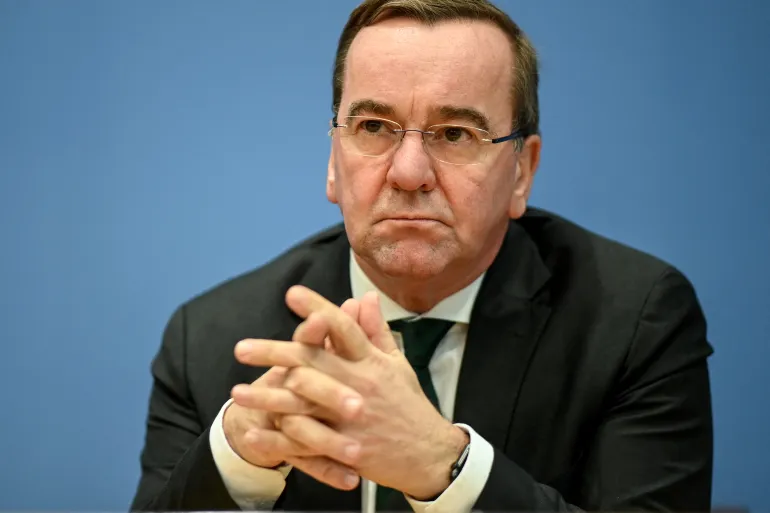Tech illiteracy allowed military call interception, says German DefMin
Boris Pistorius has disclosed that during the conference call about Ukraine, one of the generals utilized an insecure line for dialing in.
-

Germany's Defense Minister, Boris Pistorius, at a news conference in Berlin on December 11, 2020 (AFP)
Germany's Defense Minister claimed that a breach in security protocol may have occurred during a military conference call on Ukraine, intercepted by Russia, as one of the generals potentially used a non-secure line to dial in.
Boris Pistorius stated that the 38-minute conference call conducted via the Webex platform, which was later leaked by Russia Today (RT), was not intercepted by a specific Russian spy. Instead, it was likely the outcome of a random scan of insecure data during the Singapore airshow. Pistorius explained that a participant who dialed in from his hotel room, using either his mobile phone or an insecure connection in the hotel, introduced the bug.
Addressing reporters in Berlin on Tuesday morning, Pistorius disclosed that an examination of disciplinary actions is underway. This is in response to the participant who violated stringent security protocols by opting for a connection that was neither secure nor authorized.
He further stressed that Germany is implementing technical and organizational measures to prevent a recurrence of a similar incident.
Germany is in a pickle
Amid widespread criticism and considerable embarrassment surrounding the leaked German recording, during which sensitive military strategies of Germany, its European counterparts, and US allies were disclosed — revealing details such as the presence of British troops — Germany is under intense scrutiny.
However, Pistorius downplayed the situation, claiming that he had contacted many of his counterparts on Monday, and they had conveyed “no sense of annoyance towards Germany” and “reassured me that trust in Germany is uninterrupted."
He further noted that there was unanimous agreement among Germany's partners that “we won’t let ourselves be divided by this Russian attack."
The German Defense Minister stressed that each of Berlin's partners was "familiar" with such "attacks", emphasizing that the “breadth of such attacks is getting ever broader."
Pistorius characterized the interception as a component of a “perfidious game” employed by Russia against Western allies. He accused Russia of attempting to “drive a wedge” between European and US allies.
“[We] will not allow Putin to get on our nerves,” he said.
He declined to elaborate on the contents of the phone call, asserting that doing so would be “letting Putin set the agenda."
Elsewhere in his remarks, Pistorius alleged that the communication system of Germany's Defense Ministry remained uncompromised. Addressing concerns about the safety of WebEx, he said that the platform was utilized for specific discussions up to a designated security level. However, it was not the public version but rather one with an added layer of security, utilizing Bundeswehr-controlled servers instead of foreign ones.
IT specialists are currently engaged in a forensic examination of the equipment utilized by the participants, as indicated by Pistorius. Simultaneously, an inquiry into disciplinary measures is underway.
Nevertheless, he opposed demands to dismiss anyone implicated.
As long as “no serious” findings turned out of the investigation, he said he would “not let any of my best officers become the victims of Putin’s games."
Read next: Following German audio leak, Moscow summons ambassador
Dive deeper
It is worth noting that the leak, which was dated February 19, revealed officers discussing the operational and targeting details of the homegrown Taurus long-range missiles, which Germany was mulling sending to Ukraine. Interestingly, the way it was being discussed insinuated that it had already been agreed upon.
The officers were also discussing means of maintaining plausible deniability so that Germany could tread as closely as possible to the "red line" of direct involvement without crossing it.
Since the commencement of the war in Ukraine in February 2022, Germany has dispatched Leopard tanks and IRIS-T air defense systems to Kiev. Additionally, Britain and France have supplied Storm Shadow and Scalp cruise missiles.
Russian Foreign Minister Sergey Lavrov has lately expressed that the leak is proof Ukraine and its supporters "do not want to change their course at all, and want to inflict a strategic defeat on Russia on the battlefield."
On her account, Maria Zakharova, the Foreign Ministry Spokesperson, remarked that if Germany did not "promptly" provide an explanation for the talks, this would be considered "an admission of guilt."
Read next: Leaked German recording could deepen NATO rift: WSJ

 4 Min Read
4 Min Read









